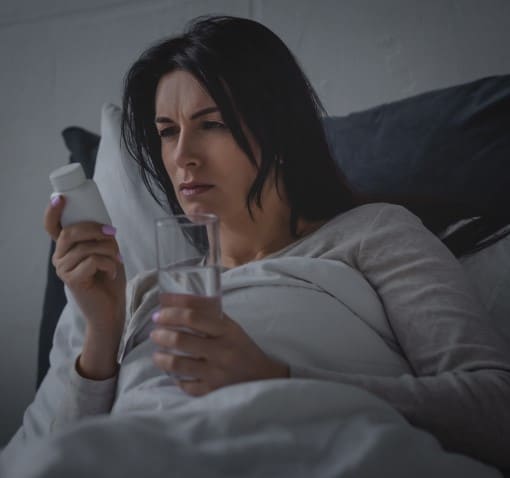
Pain meds keeping you awake? Here’s what you can do about it.
By Jason Wooden, PhD | April 2, 2020
Whether it’s for short-term use or ongoing chronic pain, some pain meds can keep you awake and make your nights worse. In this article, we discuss how they interfere with your sleep, which ones to avoid, and 12 different options you can try for better nights.
You’re not the only one…
Every day chronic pain affects the lives of millions of people which is why opiates and other prescription meds have become convenient remedies.
Pop a pill and pain all gone, right?
However, what’s one to do when your pain meds keep you to awake and miserable at night?
It’s bad enough that chronic pain all by itself can wreck your sleep. According to the National Sleep Foundation, it affects the sleep of 1 in 5 Americans.
Chronic pain can make it harder to fall asleep. It can also cause you wake up during the night as you toss and turn to get more comfortable.
Sounds familiar?
And if your pain remedy also makes it harder to fall asleep you may be looking at double trouble.
Since poor sleep can increase your sensitivity to pain, you can get into a vicious cycle where pain leads to poor sleep and poor sleep leads to more pain.
Unfortunately, chronic pain can last anywhere from weeks to years depending on your situation.
That makes it really important to do whatever you can to deal with your pain in a way that doesn’t lead to more sleep problems.
Right now, you may be feeling stuck and desperate.
Or maybe, you just want to wean yourself off of heavy duty pain meds…
We’re going to take a quick look at what really happens to your sleep when you take those pain meds and what you can do about it so you sleep more soundly at night.
Why some pain meds can keep you awake
Many people suffering from long-term chronic pain use opioids which are among the most powerful prescription pain killers you can get.
They include things such as:
- codeine
- fentanyl
- morphine
- oxycontin
- percocet
- vicodin
While prescription meds can be a godsend if you’re dealing ongoing aches and pains, these pain meds can keep you awake if you’re not careful.
So, what can go wrong with your sleep when you put them in your body?
It turns out they can make it harder to fall asleep, stay asleep, and get the deep restful stages of quality sleep your body needs.
In one study, researchers found that 89% of patients taking opiate meds for back pain had their sleep disrupted. (Back pain is one of the most common types of chronic pain.)
Opioids can also increase your risk for sleep apnea, a common sleep disorder in which breathing repeatedly stops during the night and arouses you out of deep slumber. It’s a real sleep killer that causes people to wake up feeling like they hadn’t slept at all.
Pain meds with caffeine can keep you awake too
Many prescription and over-the-counter pain medications contain caffeine.
The caffeine is added to make them more effective but it can also make it harder to fall asleep and stay asleep. You may find that you sleep more lightly and go to the toilet more often during the night.
Did you know that one dose of Anacin Maximum Strength contains 32 gm of caffeine?
And one dose of Excedrin Extra Strength comes with a 65 mg caffeine hit?
For comparison, an 8 oz cup of coffee can have anywhere between 60 mg and 96 mg of caffeine.
Experts say that caffeine has a half-life of 3 to 5 hours in the body, so they reccomend you avoid it later in the day. That’s a general rule of thumb as some people are more sensitive to caffeine than others.
Even if you’ve been able to consume caffeine in the evening fearlessly, it can catch up with you as you get older. (You can read more about this here.)
Bottom line, the caffeine in your pain meds can keep you awake at night if you’re not careful.
Keeping you awake isn’t the only downside for pain meds
You may be worried about your pain meds keeping you awake, but that’s not the only thing to think about.
The more powerful prescription painkillers come with pretty serious downsides.
In particular, opioids such as codeine, morphine, oxycodone, and Vicodin have been linked to other problems.
The side effects include:
- confusion
- nausea
- constipation
- sexual dysfunction
- low blood pressure
- itching
They’re also highly addictive and over time you need higher amounts to get the same effect. Some may eventually make you more sensitive to pain.
That’s even more motivation to look for other ways to help manage your pain.
What to do if your pain med keeps you awake
Okay, we’ve talked what can happen to your sleep when you take over the counter and prescription pain meds.
If your pain meds are keeping you up at night, you need to do something about it.
Fortunately, you have plenty of options:

1) Change your dosage
This one’s pretty obvious. Check with your doctor to see if a lower dose will give you some pain relief with fewer effects on your sleep. It’s worth a try.

2) Try a different pain med
If you’re taking an opiate pain killer, check with your doctor about switching to a non-opiate such as acetaminophen. If you’re taking a pain med that contains caffeine, your doctor may suggest something milder.

3) Try a different mattress
In some cases, a mattress can make a big difference for night time pain. Are you a side or back sleeper? Is your pain in the back, neck, or somewhere else?
Depending on your situation, you may want to try something firmer or softer, memory foam, or an adjustable bed. Learn more

4) Physical activity
Studies have found that exercise can help people manage pain. Gentle activities such as walking or swimming can help improve your recovery and pain threshold. Learn more

5) Physical therapy
Physical therapy uses heat, cold, exercises, massage, and manual manipulation. It can help strengthen muscles and increase flexibility.
It’ll also increase blood flow and help reprogram your nervous system to be less sensitive to pain. Learn more

6) Try an anti-inflammatory diet
These diets focus on avoiding specific foods such as refined carbs to help decrease inflammation and consuming more foods believed to fight inflammation. Learn more

7) Acupuncture
This technique involves stimulating specific points on the body with thin needles. Research suggests it can help some types of pain. It should be done by a well-trained professional. Learn more

8) Biofeedback
Biofeedback uses electronic devices to increase your awareness of your body functions so you can learn to control them. Depending on the cause, it may help with chronic pain. Learn more

9) Massage therapy
This therapy involves massaging the soft tissues of the body. It can help relieve pain through relaxing painful muscles and joints, reducing stress and anxiety, and overriding pain signals. Learn more

10) Meditation
Meditation is a mind-body practice in which you focus your attention on something such as an object or your breathing. It calms the body and mind which can help with pain. Learn more

11) Psychotherapy
Did you know that pain has psychological, and emotional factors? Psychotherapy can change the way you cope with pain and change the stress response in the brain responsible for the release of chemicals that make pain worse. Learn more

12) Music therapy
Studies have shown that the right music can help relieve pain. Music that promotes relaxation can alleviate anxiety and stress which contribute to pain. Learn more
Depending on your situation, you may want to combine more than one approach for better results.
You should also practice good sleep hygiene, the everyday things that can set the stage for quality sleep during the night. It involves things like maintaining a regular bedtime routine and sleep-friendly bedroom environment.
Depending on where you live, you may need earplugs to block out neighborhood noises. You may want to try a face mask or black out curtains if you’re dealing with excessive night time lighting.
Bad sleep hygiene can undercut everything else you do to improve your sleep.
Sleep hygiene tips
- Keep consistent wake up and sleep times
- Avoid naps
- Exercise during the day
- Avoid large meals, alcohol, or stimulants such as caffeine before bedtime
- Maintain a bedtime routine to wind down
- Avoid using TVs, laptops, or other electronics before sleep
- Keep your sleep environment dark, cool, quiet, and relaxing
Pain meds aren’t the only ones that can keep you awake
Did you know that your pain meds aren’t the only prescriptions that could be keeping you awake at night? Many medications commonly used for other health issues can cause sleep problems.
Some of the medications known to affect sleep include:
- Attention deficit disorder meds (sympathomimetic stimulants)
- Anti-inflammatory meds (corticosteroids)
- Anti-smoking meds
- Anxiety and depression meds (SSRIs)
- Appetite suppressants
- Asthma meds (corticosteroids, theophylline)
- Cholesterol reduction (statins)
- Cold and allergy meds (antihistamines)
- Cough, cold, and flu meds that contain alcohol
- Heart meds (anti-arrhythmics)
- High blood pressure meds (beta blockers, diuretics)
- Thyroid meds
You can check with a doctor to see if any of your prescriptions affect sleep and what you can do about it.

Sources:
1. “How to sleep well despite chronic pain”, Harvard Health Publishing
2. Sleep abnormalities associated with alcohol, cannabis, cocaine, and opiate use: a comprehensive review. Addiction Science & Clinical Practice, volume 11, Article number: 9 (2016)
3. “Chronic opioid therapy can disrupt sleep, increase risk of sleep disorders”, American Academy of Sleep Medicine website
4. Disrupted sleep patterns and daily functioning in patients with chronic pain. Pain Res Manag. 2002 Summer;7(2):75-9.
5. “27 Chronic Pain Statistics Everyone Should Know”, DisturbMeNot.co
6. “How Medications May Affect Sleep”, National Sleep Foundation website
Connect with us:
About Us
Better Sleep Simplified® was founded as a place for you to get clear and well-researched information.
Our goal is to make sure you know about your options so that you take action sooner rather than later.
Check us out on YouTube:
Watch and Learn
Helpful sleep tips, interesting sleep facts and statistics you want to know about
Affiliate Disclosure
This site is a participant in the Amazon Services LLC Associates Program and other affiliate advertising programs designed to provide a means for sites to earn advertising fees by advertising and linking to them.
Important: BetterSleepSimplified.com is for informational purposes only and is not intended or implied to be a substitute for professional medical advice, diagnosis, or treatment. Always consult a physician for sleep and health concerns. See additional information.
